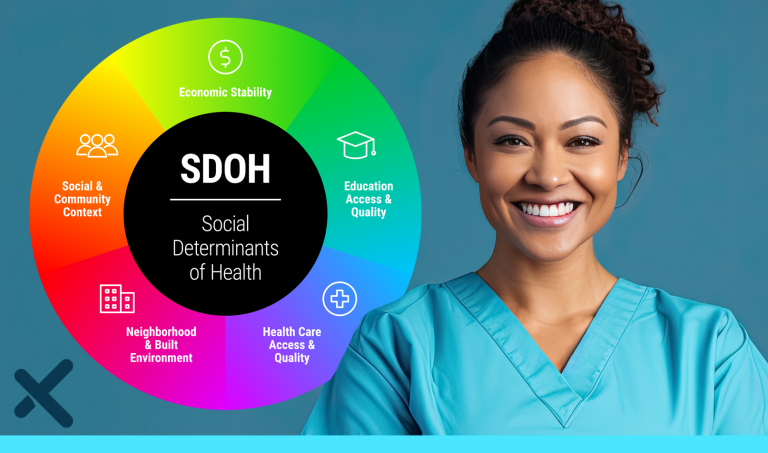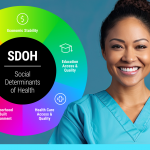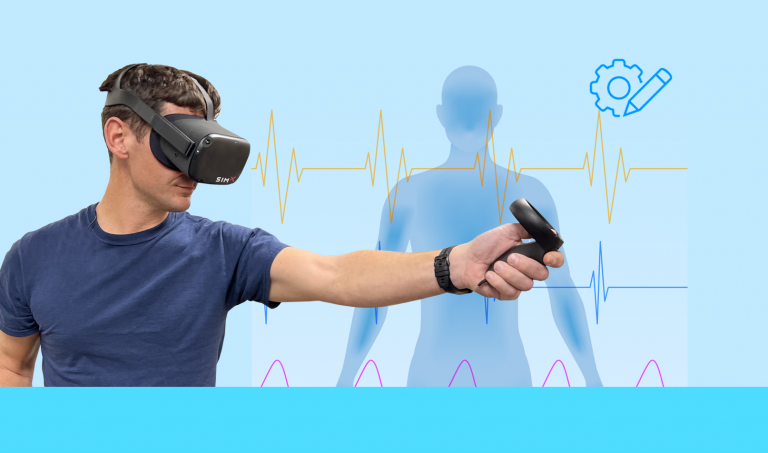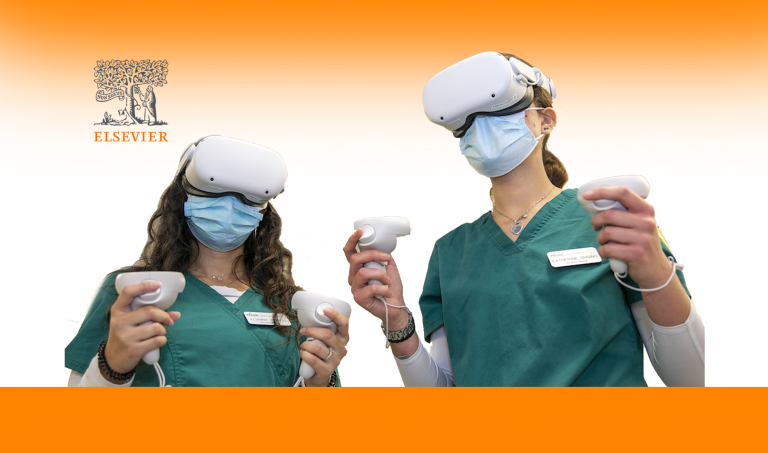This bundle focuses on the holistic approach to patient care, concentrating on the social determinants of health and health equity. Through these virtual patient encounters, learners experience various scenarios that highlight the complex social, environmental, and psychological factors affecting patient health. Each scenario is meticulously crafted to challenge the learner in recognizing, understanding, and addressing these factors in a clinical setting, all while emphasizing the importance of patient-centered care.
*This does not count as a singular case selection. This is a list of case recommendations.
Included Simulated Patient Encounters:
1) Brief Psychotic Disorders: Mental Health
- Features Sam, a Caucasian female experiencing psychotic symptoms after her boyfriend’s detention by ICE.
- Key Learning Points: Mental health assessment, validating patient concerns, recognizing environmental stressors, and psychiatric medication consideration.
- Focuses on a postpartum visit to a 16-year-old new mother experiencing breastfeeding difficulties.
- Key Learning Points: Newborn assessment, home safety, breastfeeding coaching, and parental coping strategies.
3) A Community Health Nurse Experience
- Set at a mosque during a health fair, learners engage with a senior Bangladeshi male.
- Key Learning Points: Cultural competence, preventive health screenings, medication adherence, and community engagement.
4) Violent Adolescent Drug Abuse
- Learners navigate Samuel’s anger and substance abuse issues within the context of his life in foster care.
- Key Learning Points: Therapeutic communication, empathy, and history gathering.
5) Neonatal Abstinence Syndrome
- Scenario involving a 2-day-old baby with potential Neonatal Abstinence Syndrome (NAS) signs.
- Key Learning Points: Neonatal exam, maternal history gathering, NAS education, and interprofessional communication.
6) Postpartum Follow-Up Depression Screening
- Focuses on AnaLee Diaz, a Hispanic new mother who might be experiencing postpartum depression due to missing “la cuarentena.”
- Key Learning Points: Use of interpreters, therapeutic communication, depression screening, and cultural understanding.
- Learners engage with Farrah Essa, who presents with burn injuries, and her potentially abusive husband.
Key Learning Points: Triage and assessment, injury evaluation, interprofessional collaboration, and identifying signs of domestic violence.
- Centers on a patient with bipolar disorder displaying suicidal ideation.
- Key Learning Points: Therapeutic environment establishment, suicide risk assessment, and safety planning.
The “Social Determinants of Health Bundle” offers a comprehensive set of virtual patient scenarios that provide learners the unique opportunity to hone their skills in patient-centered care, with a specific emphasis on addressing the social determinants of health and ensuring health equity. Each encounter provides a rich narrative that underscores the intricate balance between medical science and the human element in healthcare.
What is SDH? What are the social determinants of health?
The social determinants of health (SDH) are the non-medical factors that influence health outcomes. They are the conditions in which people are born, grow, work, live, and age, and the wider set of forces and systems shaping the conditions of daily life. These forces and systems include economic policies and systems, development agendas, social norms, social policies, and political systems.
The SDH has an important influence on health inequities – the unfair and avoidable differences in health status seen within and between countries.
The following are examples of the social determinants of health that can influence health equity in positive and negative ways:
- Income and social protection
- Education
- Unemployment and job insecurity
- Working life conditions
- Food insecurity
- Housing, basic amenities and the environment
- Early childhood development
- Social inclusion and non-discrimination
- Structural conflict
- Access to affordable health services of decent quality.
Learning Objectives
- Patient-Centered Care:
- Demonstrate the ability to provide individualized care, understanding each patient’s unique background, circumstances, and needs.
- Holistic Assessment:
- Conduct comprehensive patient evaluations that factor in not only medical symptoms but also psychosocial, environmental, and cultural considerations.
- Recognition of Social Determinants:
- Identify and understand the broader social determinants of health and their influence on patient well-being and health outcomes.
- Effective Communication:
- Apply therapeutic communication techniques tailored to different patient backgrounds and conditions.
- Effectively use interpreters and other communication aids to ensure clear understanding.
- Cultural Competence:
- Provide care that respects and is sensitive to cultural diversity, ensuring that healthcare advice and recommendations are culturally appropriate.
- Interprofessional Collaboration:
- Collaborate seamlessly with various members of the healthcare team, including specialists, social workers, and support services, to ensure comprehensive patient care.
- Safety and Risk Assessment:
- Recognize signs and symptoms of risk factors, such as domestic violence or suicidal ideation, and conduct necessary assessments and interventions promptly.
- Education and Counseling:
- Educate patients and their families on various health conditions, treatment plans, and preventive measures, tailored to their specific needs and backgrounds.
- Offer support and guidance, particularly in areas like breastfeeding, postpartum care, and substance abuse.
- Ethical Practice:
- Ensure care provided is ethical, respecting patient autonomy, and promoting justice and equity in healthcare.
- Advocacy
- Act as an advocate for patients, ensuring they receive the resources, support, and care they require, particularly when facing systemic barriers or challenges.
In essence, the bundle aims to equip learners with the knowledge and skills needed to deliver holistic, culturally competent, and patient-centered care, understanding the myriad of factors beyond medical symptoms that influence patient health.
MINIMUM:
OS: Windows 10
Processor: Intel Core i5-2300 | AMD FX-4350
Memory: 4 GB RAM
Graphics: Nvidia GeForce GTX 2060
DirectX: Version 11
Storage: 12 GB available space
RECOMMENDED:
OS: Windows 10
Processor: Intel Core i7-2300 | AMD FX-4350
Memory: 8 GB RAM
Graphics: Nvidia GeForce GTX 3060
DirectX: Version 11
Storage: 12 GB available space
Interested in this scenario?
Sign up to talk with a member of the SimX team today!




